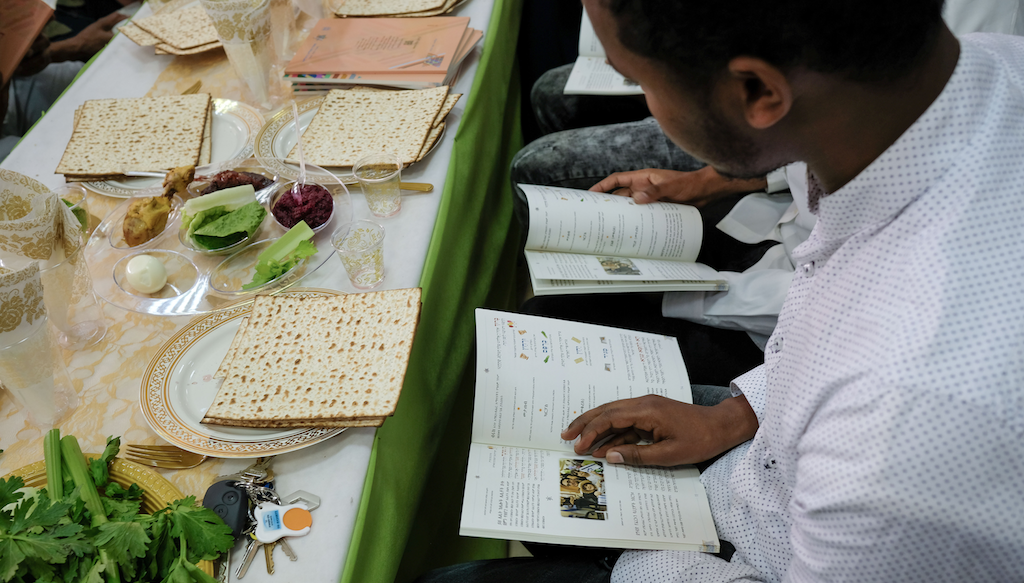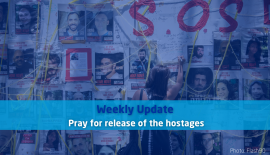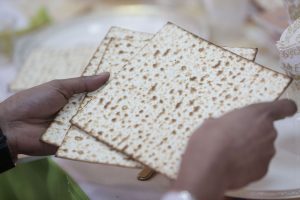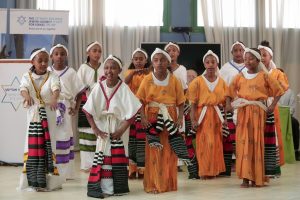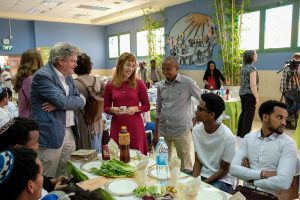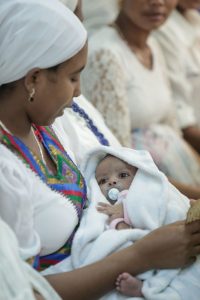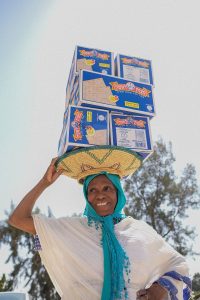Ethiopian Jews: Pre-Seder
A long, imposing procession of men and women. Stately they come walking into the hall. Eighty in total, young and old.
Some seem almost antique, with beautifully painted faces. Many wear traditional Ethiopian clothing. The women have their heads covered. Some of them are pregnant; others carry babies in cloth. Here and there a baby cries, but otherwise, it is quiet. The scene looks like a painting straight from Ethiopia. Upon entering the hall, filled with long festively decorated tables for the pre-Seder, guests are escorted to their places in sign language and some basic Hebrew. They look around uncomfortably. But when the rabbi begins to talk about Passover, everyone listens intensively.
Family reunion
The group was brought to Israel from Ethiopia five months ago by the Jewish Agency and the State of Israel and is part of the family reunification project. They stay in Haruv, the absorption-centre for Ethiopian Jews in Beersheba. There they will prepare for their new life in Israeli society. Danielle Mor, Vice President, Israel and Global Philanthropy of The Jewish Agency for Israel: “Here we teach them the language and customs of the country and about Judaism and Jewish holidays. Every year, about a week before Pesach, we organise a pre-Seder for the newcomers, in centres all over the country. This year this has been made possible by the Jewish Agency and Christians for Israel, among others.”
The pre-Seder starts. The rabbi explains about the Seder-dish and the various rituals. Someone standing next to him translates everything he says into Amharic, the Ethiopian language. Under the direction of the rabbi, the translator reads from the bilingual Haggadah, the prayer book for the Seder.
Same Melodies
As I listen, along with all the other attendees I pour the first glass of wine, my thoughts go back to many years ago. During a study trip to Israel, I visited an absorption-centre for Ethiopian Jews. They had just arrived in Israel and came straight from Ethiopia. They still had to learn about their new life, and many things were totally new to them. Such as the use of a toilet. They thought, I was told, that it was a bowl to make pickles in!
It was just before Passover, and several women practised the prayers and songs with each other that they always sang in Ethiopia on Seder evening. I could not believe my ears. They were the same melodies that we sing at home. It moved me. One of the miracles of Judaism: wherever in the world Jews live, many traditions and customs are the same all over the world, making our bond strong.
Back to the pre-Seder in Beersheba, the rabbi tells about Pesach, a celebration full of symbolism. The story of oppression and spiritual freedom, and about renewed hope that Jews throughout the world celebrate. “An age-old tradition, the epitome of a centuries-long dream of returning to Israel.”
Cleaning
I am curious to know how Pesach used to be celebrated in Ethiopia. But the newcomers do not know enough Hebrew or English to answer my questions. Years ago, I interviewed Asher (Mekunnt) Rahamin. He came to Israel in 1983, at the age of fifteen. We still have contact now and then, so I call him with my questions. “Life in our village, with about 30 families, had a clearly Jewish character. All Jewish holidays were celebrated openly. For us, Judaism was like the rising of the sun: a fixed part of our lives. A few weeks before Passover, our village elder told us that it was almost there. That meant that the women started with the big cleaning to make the houses chametz-free (bread free). Together we made matzah (flat, dry cracker-like bread) and on the day of the Seder, a lamb was slaughtered in the afternoon. During the Seder, the whole village came together in the house of the village elder and read from the Torah, about the Exodus from Egypt. In Ethiopia, at that time there were no prayer books and no Haggadahs. During the Seder, we ate matzah and lamb and sang the prayers and songs together. And the elders of our village told about the Passover celebrations in their youth.”
The pre-Seder is almost finished. Together the traditional Lesjanaha HaBa’ah Bejerushalaim (’Next year we are in Jerusalem’) is sung while everyone claps their hands. For this group their ultimate wish has come true: they are finally home.
Ethiopian Jews
More than 135,000 Ethiopian Jews live in Israel. Their lives in Ethiopia were never very bad. With the existing anti-Semitism, they could live. However, a deep desire to emigrate to Israel – and especially to Jerusalem – was passed on from generation to generation. They considered their stay in Ethiopia as temporary. In 1862, there was a group who tried to emigrate to Israel, but they failed. ‘Operation Moses’ in 1984 brought eight thousand Ethiopian Jews secretly through Sudan to Europe and from there to Israel. In 1991 another fifteen hundred went to the promised land with the ‘Operation Salomon’ and over the years, other groups have followed. In 2013, Israel officially stopped immigration from Ethiopia. But in the context of family reunification, the former Israeli minister Silvan Shalom of the Ministry of Interior decided that the last group of Ethiopian Jews should also be brought to Israel. It would involve eight thousand men, women and children. In 2017, 1308 Ethiopian Jews were brought to Israel. It isn’t known what will happen in 2018.
